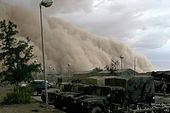This is the second article in the Christmas On Deployment series, where veterans, active duty military personnel, law enforcement and first responders share their experiences and feelings. It’s an effort to give Americans an idea of the price paid for our freedom. The first article is here.
Dave is a Marine who served at Al Asad Air Base in Iraq from August 2004 to March 2005. He was the Platoon Sergeant for 4th Platoon, A Company, first Provisional Security Battalion. He wrote a great description of Christmas in 2004, and the context surrounding it.
Nighttime Watch, and Burn Pits
“My platoon was a combination of reservists and active duty Marines from Pasadena, CA and Marietta, GA; and active duty Marines from Marine Corps Air Station 1 in Yuma, Arizona (MCAS Yuma). “A” Company was tasked with perimeter defense. There were 28 mutually-supporting towers around the perimeter, with two Marines on the towers at all times.”
The Marines had trees and decorations covering their ‘cans,’ and we got lots of care packages and cards from the folks back home.
The Marines stood watch in shifts of six to eight hours. The worst assignments were to the four or five towers closest to the burn pits, where everything might be burned, from trash to electronic equipment to latrine waste. Their usual work day lasted over twelve hours, including administrative and disciplinary matters and PT.

“My platoon started out in early September on the 2000-0200 shift, but by the time Christmas rolled around we were on the 0200-0800 shift. Night time perimeter defense could be hairy (we had 3000+ Marines and a bunch of civilians to keep safe) but we had some good night vision ‘white-hot’ scopes, not the older PVS-7’s. Most of the time it was quiet, though. No breaches of perimeter security happened on our watch.”
Just Another Day
“The thing that stands out the most is that Christmas Day was just another day. We lived in a ‘can city’ – our quarters were metal shipping containers ten feet square or ten by twenty feet. The Marines had trees and decorations covering their ‘cans,’ and we got lots of care packages and cards from the folks back home.”
“But we still had 3000+ Marines on Al Asad to protect. These Marines had been on watch 12-plus hours a day for months, in the dark. But there wasn’t any bitching other than the normal bitching that goes on among Lance Corporals. We had a job to do, the Marines knew it, and we did it, and Christmas was just another day where they showed up and did it. I never cease to find that amazing. I couldn’t have asked for a better platoon.”
News of home and care packages were reminders that they were loved and remembered. But their focus on Christmas Day was the same as every other day. They were there to defend their comrades, over 3,000 Marines, and the civilians associated with Al Asad base.
Send In Your Stories of Christmas On Deployment
Your experiences may or may not be dramatic. Most veterans say the same thing: some variation of “Oh, you know, it wasn’t very interesting, nothing really happened.” They don’t understand what civilians want to know.
… their families and friends want to know about their lives. So do the strangers who pray every night, asking God to protect our troops.
All deployed troops long for letters from home. Any letters – even those with only newsy bits about family and friends. Those newsy bits help them feel connected to home, to the things they are fighting for.
In the same way, their families and friends want to know about their lives, even the times when nothing really happened. So do all the strangers in America who pray every night, asking God to protect our troops. These stories are for them. What I’m looking for is to reflect the totality of the experience.
What did you do on Christmas Eve on a base in Viet Nam or Afghanistan, Iraq or Incirlik? On Christmas Day on an aircraft carrier or a destroyer? What made it difficult, and more important, what made it bearable? What would you like your kids, your parents, your brother, to know about your deployment? Please email me your stories at [email protected] and I will retell them here. If you include your contact information, I will reach out and interview you. Help those who support our troops, pray for our troops, and thank you for your service understand what they are thanking you for. Thank you.
















